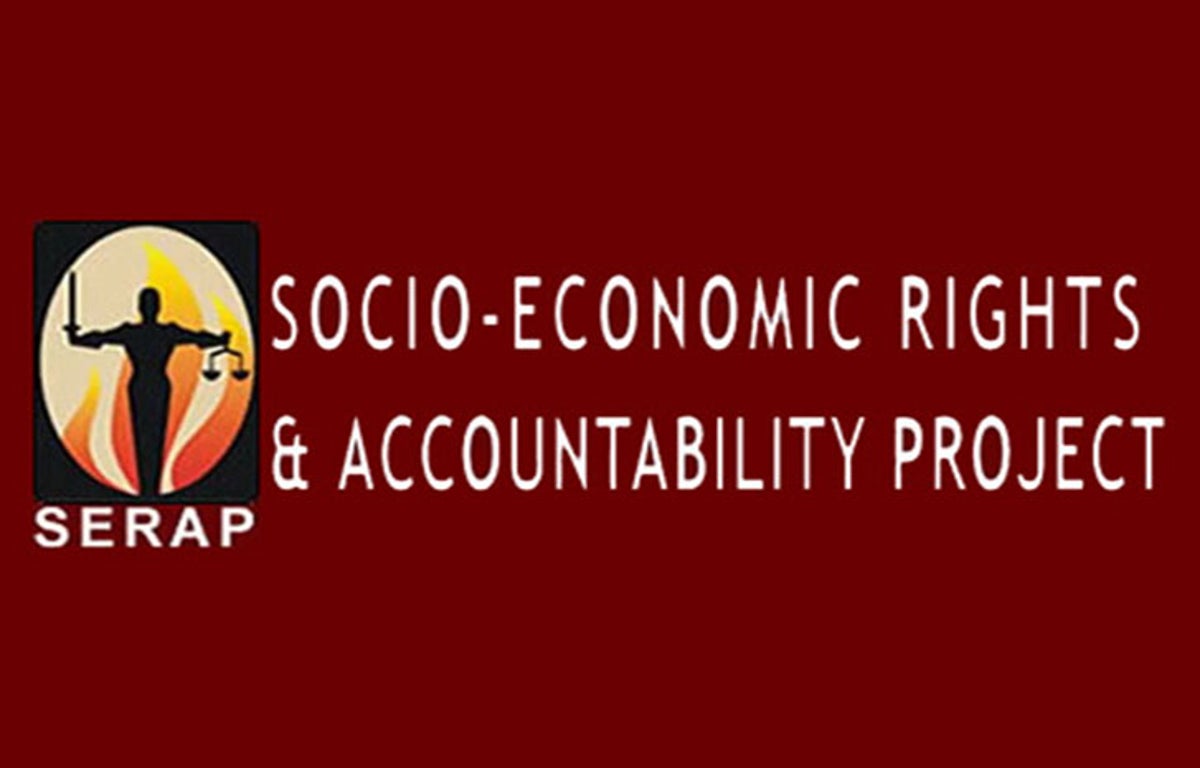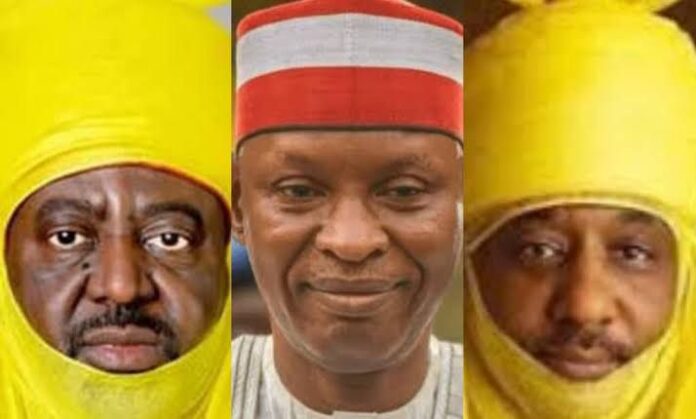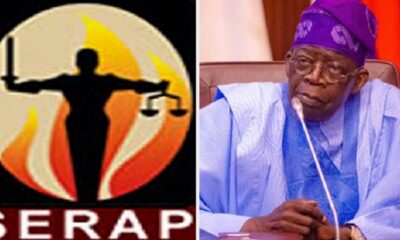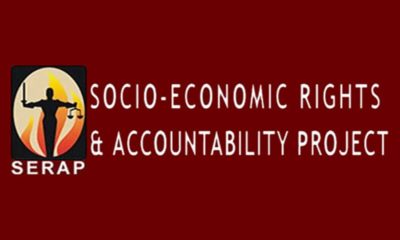NEWS
JUST IN: SERAP Sues CBN Over Missing N100bn Dirty Notes, Other Public Funds

The Socio-Economic Rights and Accountability Project (SERAP) has filed a lawsuit against the Central Bank of Nigeria (CBN) “over the failure to account for and explain the whereabouts of the over N100 billion ‘dirty and bad notes’ and ‘other large sum of cash awaiting examination’ which are kept in various branches of the CBN.”
This was revealed in a statement on Sunday by its Deputy Director, Kolawole Oluwadare.
In the suit number FHC/L/MSC/441/2024 filed last week at the Federal High Court, Lagos, SERAP is asking the court to “direct and compel the CBN to explain the whereabouts of the over N100 billion dirty and bad notes kept in various branches of the Central Bank of Nigeria (CBN) since 2017.”
The SERAP is also asking the court to “direct and compel the CBN to explain the whereabouts of the N7.2bn meant for the construction of the CBN Dutse branch building in 2010 and the N4.8bn meant for the renovation of the CBN Abeokuta branch in 2009 and to publish the names of contractors who collected the money.”
ALSO READ: SERAP Drags CBN On N100bn Dirty Notes, Other Missing Public Funds
According to the statement, the SERAP is asking the court to “direct and compel the CBN to explain the whereabouts of the allegedly missing outstanding loan of N1.2bn granted to the Enugu State government in 2015 and the outstanding loan of N1.9bn granted to the Anambra state government between 2015 and 2016.”
In the suit, the SERAP is arguing that, “Explaining the whereabouts of the missing public funds, publishing the names of those suspected to be responsible and ensuring that they are brought to justice and the full recovery of any missing public funds would serve the public interest and end the impunity of perpetrators.”
The SERAP is also arguing that, “These grim allegations by the Auditor-General of the Federation suggest grave violations of the public trust, the provisions of the Nigerian Constitution, the CBN Act, and national and international anticorruption obligations.”
According to the SERAP, “These grave violations also reflect a failure of CBN accountability more generally and are directly linked to the institution’s persistent failure to comply with its Act and anti-corruption standards.”
The SERAP is arguing that, “These allegations have seriously undermined the ability of the CBN to effectively discharge its statutory functions and the public trust and confidence in the bank. The CBN ought to be committed to transparency and accountability in its operations.”
The suit filed on behalf of SERAP by its lawyers Kolawole Oluwadare and Adelanke Aremo, read in part, “Nigerians have the right to know the whereabouts of the public funds. Granting the reliefs sought would advance the right of Nigerians to restitution, compensation and guarantee of non-repetition.
“Paragraph 708 of the Financial Regulations 2009 provides that, ‘on no account should payment be made for services not yet performed or for goods not yet supplied.’”
“Section 35(2) of the Public Procurement Act 2007 provides that, ‘once a mobilization fee has been paid to any supplier or contractor, no further payment shall be made to the supplier or contractor without an interim performance certificate.
“Section 16(6) of the Public Procurement Act states that ‘all bidders shall possess the necessary professional and technical qualifications to carry out particular procurements; the financial capacity and adequate personnel to perform the obligations of the procurement contracts.’
“SERAP notes that Section 15(5) of the Nigerian Constitution requires public institutions to abolish all corrupt practices and abuse of power.” Section 13 of the Constitution imposes clear responsibility on the CBN to conform to, observe and apply the provisions of Chapter 2 of the constitution.
“Paragraph 3112(ii) of the Financial Regulations 2009 provides that, ‘Where a public officer fails to account for government revenue, such officer shall be surcharged for the full amount involved and such officer shall be handled over to either the Economic and Financial Crimes Commission (EFCC) or the Independent Corrupt Practices and Other Related Offences Commission (ICPC).’
“Nigeria has made legally binding commitments under the UN Convention against Corruption to ensure accountability in the management of public resources. Articles 5 and 9 of the UN Convention against Corruption also impose legal obligations on the CBN to ensure proper management of public affairs and public funds.
“The Nigerian Constitution, Freedom of Information Act, and the country’s anti-corruption and human rights obligations rest on the principle that citizens should have access to information regarding their public institutions’ activities.
“According to the recently published 2020 audited report by the Auditor General of the Federation (AGF), the Central Bank of Nigeria (CBN) has since 2017 been keeping over N100 billion [N100,672,999,000.00] ‘dirty and bad notes’, and other large sum of cash awaiting examination in various branches of the CBN.
“The Auditor-General fears that the ‘dirty and bad notes’ initially planned to be destroyed may have been ‘be diverted and re-injected into the economy.’
“The CBN in August 2010 also reportedly budgeted N7.2 billion [N7,286,500,476.76] for the construction of Dutse branch building. The Dutse branch was due to be completed in November 2012 but the contractors have failed to complete the project.
“The Auditor-General is concerned that the project may have been ‘awarded to incompetent contractor,’ and wants the ‘job completed without further delay.’
“The CBN in 2009 reportedly budgeted N4.8 billion [N4,812,608,028.10] for the renovation of the CBN Abeokuta branch. The Abeokuta branch was due to be completed in 2012 but the contractors have failed to complete the project.
“There is no significant renovation work on the site, several years after the proposed completion date. The Auditor-General is concerned that the project may have been ‘awarded to incompetent contractor,’ and wants the ‘job completed without further delay.’
“The CBN also reportedly failed to account for the missing outstanding loan of N1.2 billion [N1,294,453,887.83] granted to the Enugu state government in 2015 and the outstanding loan of N1.9 billion [N1,994,383,561.64] granted to the Anambra state government between 2015 and 2016.
“The Auditor-General fears the public funds may have been diverted. He wants the money fully recovered and remitted to the treasury.”
No date has been fixed for the hearing of the suit.
NEWS
Ohanivo Upbeat As Sen Umahi Emerges Silverbird’s Most Outstanding Minister Of The Year

The entire 10 communities of the old Ohaozara Local Government Area, known as Ohanivo, of Ebonyi State have been reverberating with joy, because their illustrious son, the Minister of Works, HE Sen. Engr (Dr) Nweze David Umahi emerged Silverbird’s Most Outstanding Honourable Minister of the Year.
Biztellers reports that Ohanivo is made up of three LGAs, including, Ohaozara, Onicha and Ivo, while the 10 autonomous communities are Uburu, Okposi, Aka Eze, Ishiagu, Isu, Onicha, Ugwulangwu, Ukawu, Abaomege, and Oshiri.
Feelers from the organisers of the glamourous awards, Silverbird Group, assure that plans have been fine-tuned for the annual event, billed for the Eko Hotel and Suites, Victoria Island, Lagos on Sunday.
There are indications that a strong team of community leaders including Chief Kenneth Eze, Uche Umezurike, Okoro Enekwachi, Francis Ekwe, Emma Nwaze, among others would be on ground to cheer the distinguished minister of works as he receives his well-deserved award.
ALSO READ: Edo Women Protest Against Natasha Over Akpabio
In a related development, the Member, House of Representatives, representing Ohaozara/Onicha/Ivo Federal Constituency, Hon. (Dr.) Kama Nkemkanma, has sent his congratulatory message to Sen Umahi.
Hon Nkemkanma’s message reads, “It is with deep pleasure that I convey the profound felicitations of my family and good people of Ohaozara/Onicha/Ivo Federal Constituency to our dear leader and achiever, His Excellency, Sen. Engr (Dr) Nweze David Umahi CON, FNSE, FNATE, GGCEHF, Honourable Minister of Works on his emergence as the Silverbird Most Outstanding Honourable Minister of the Year. Whom the cap fits, let him wear.
“Your Excellency, the initiative of this administration to construct the Renewed Hope four (4) legacy projects and the will power to continue the funding and construction of the inherited on-going projects across the six (6) Geo-political Zones are eloquent testimonies of the commitment of Mr President in unlocking the potentials of every segment of our country and building a regenerative economy for sustainable future. We are proud that you have unmitigated signature in this memory. May God continue to give you the flourishing grace and enablement to always be on top in your endeavours.
“Please accept the assurances of the prayers, solidarity, and esteemed regards of my constituents, always. Once more congratulations.”
NEWS
Kano Gov’t Clarifies Appeal Court Ruling On Emirship Dispute

The Kano State Government has addressed widespread misinterpretations surrounding the recent Court of Appeal judgment on the ongoing emirship dispute, urging the public to rely on accurate legal information.
In a statement issued on Saturday, Governor Abba Yusuf’s spokesman, Sunusi Dawakin-Tofa, clarified the ruling and the government’s position.
READ MORE: JUST IN: Court Of Appeal Orders Retrial In Kano Emirate Dispute
Speaking at a press briefing at the Nigeria Union of Journalists (NUJ) Secretariat in Kano, the state’s Attorney General and Commissioner for Justice, Haruna Dederi, explained that the Court of Appeal’s verdict, delivered on January 10, 2025, upheld the repeal of the Kano Emirate Council Law, 2019, effectively overturning the previous judgment of the Federal High Court, Kano.
However, Dederi noted that Alhaji Aminu Dan’agundi, who was dissatisfied with the ruling, has since filed an appeal at the Supreme Court.
He further stressed that the Appeal Court’s judgment remains binding until the Supreme Court rules otherwise.
Addressing concerns over the stay of execution recently granted by the Court of Appeal, the Attorney General described it as a standard legal procedure intended to maintain the status quo pending the Supreme Court’s final decision.
“The Kano State Government urges the public to remain calm, law-abiding, and avoid any form of provocation,” the statement read.
The government has also directed its legal team to thoroughly review the proceedings and determine the next steps in accordance with the law.
On behalf of the governor, Dederi expressed appreciation to the people of Kano for their patience, understanding, and continuous prayers for peace and progress in the state and the nation.
The emirship dispute has been a topic of intense debate in Kano, with various legal and political implications.
NEWS
Niger Delta Youths Threaten Oil Shutdown Over Rivers Crisis

Tensions are rising in Rivers State as the Niger Delta Youth Council (NDYC) has issued a seven-day ultimatum to President Bola Tinubu, threatening to halt oil production in response to the ongoing political crisis in the state.
In a statement signed by its president, Bene Youkore Mamamu, and made available to journalists in Warri on Saturday, the group listed three key demands: the restoration of Rivers State’s statutory revenue allocation, an end to alleged impeachment moves against Governor Similaye Fubara, and a public retraction of reported anti-Ijaw remarks attributed to former Governor and current FCT Minister, Nyesom Wike.
READ ALSO: BREAKING: Rivers Chief Judge Under Probe For Alleged Age Falsification
The youth group warned of dire economic consequences if their demands were ignored.
“We are ready to shock the world in seven days. The oil that fuels this nation flows from our land, the fourth largest and most populated ethnic group in Nigeria. We will not allow Wike, who we suspect is being used by the Presidency, to sabotage our region and undermine Ijaw history,” the statement read.
The NDYC accused Wike of attempting to manipulate the political landscape of Rivers State and marginalize the Ijaw ethnic group, citing his reported comments describing the Ijaws as a “minority within a minority.”
The group labeled the remarks as “provocative, inflammatory, and a declaration of economic and political war.”
Further criticizing the Federal Government, the NDYC alleged that President Tinubu’s administration was enabling Wike’s interference in Rivers politics.
“We are angry that Tinubu’s government has empowered Wike and the Judiciary to undermine Ijaws and the Niger Delta region, with regular threats to impeach Governor Fubara, seize the state’s allocation, insult late Pa Edwin Clark, and rewrite the history of the Ijaw nation,” the letter continued.
With the deadline fast approaching, the NDYC has called on its members to prepare for action, warning that oil production across the region could be disrupted if their demands are not met.
The potential shutdown poses a serious threat to Nigeria’s economy, given that the Niger Delta remains the country’s primary source of crude oil revenue. A disruption could exacerbate economic challenges, including foreign exchange shortages and rising inflation.
















